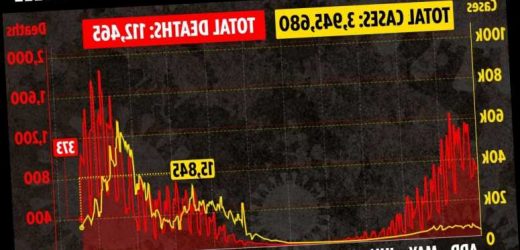THE UK has recorded its lowest daily Covid death toll since the lockdown began in early January after another 373 fatalities were recorded.
The shutdown and the jabs roll-out have forced cases down a quarter in a week, while fatalities are down 36 per cent. Deaths were last this low six weeks ago on December 28, when 357 people were recorded to have died.
? Read our coronavirus live blog for the latest news & updates
A further 15,845 positive tests were recorded overnight – a plunge on this time last week, when there were 21,088 new infections and 587 deaths.
In hospitals in England, 410 more people have died with the deadly bug.
Patients were aged between 28 and 100, and nine – aged 42 to 79 – had known underlying health conditions.
The majority of the fatalities – 110 – were recorded in the Midlands, with 83 in the south-east, 55 in London, 49 in the north-west and 48 in the north-east and Yorkshire.
A further 41 people died in the east of England, while 24 fatalities were recorded in the south-west.
In Scotland, 584 new cases and seven further fatalities were reported. In Wales, 461 positive tests and 28 more deaths were recorded by health officials.
There are tentative hopes the country is now getting past the darkest days of the crisis – after Brits faced the deadliest month of the pandemic so far in January.
During the April peak, the highest daily death toll recorded was 1,010.
So far in January and February, that tragic figure has been exceeded on 22 days.
It comes as:
- Covid infections must fall by another 95 per cent to just 1,000 a day before lockdown is lifted, NHS bosses say
- WHO chiefs have refused to rule out claims the virus originated in a secretive Wuhan lab
- 'Brave' Britain has been praised for its pioneering work on the fight-back against coronavirus
- Tens of thousands of UK kids are being left in 'crippling pain' from long Covid
- Millions of Brits aged under 50 will get their vaccine at work
The UK's vaccinations programme continues apace – with almost 1,000 jabs delivered in just an hour yesterday.
In total, 12,014,288 Brits have now been given at least one jab – and a whopping 550,468 were administered in the past 24 hours.
Vaccines Minister Nadhim Zahawi revealed the good news as he reassured Brits that AstraZeneca are "confident" their jab can halt serious illness caused by a super-infectious mutant strain first spotted in South Africa.
The official spoke amid claims the Oxford inoculation was less effective against the variation.
The small study, which has not yet been peer-reviewed, offered early data on the conclusion.
Mr Zahawi this morning said he had spoken to England's Deputy Chief Medical Officer Jonathan Van Tam about the study.
"Through their own trials, AstraZeneca is confident that it does effectively deal with serious illness, serious disease and hospitalisation," he said.
In more good news, the minister he believes the UK will have inoculated every adult over the age of 50 by May – paving the way for tough lockdown laws to be eased.
"I am confident, because I have enough line of sight of the deliveries that are coming through, that we will also meet the one to nine cohorts by May," he said.
And UK scientists are celebrating after data revealed delaying the second vaccine boosts immunity against Covid.
The Government had faced criticism from some after saying the priority must be getting jabs in as many arms as possible – rather than double-dosing fewer people.
Now it's been proved that one jab of the Oxford vaccine gives 76 per cent protection after three months – and appears to cut transmission.
Meanwhile, a single shot of the Pfizer vaccine gives 90 per cent Covid protection after 21 days.
And a key academic in the Oxford/AstraZeneca vaccine effort said the delay in a second jab makes people more resilient to the virus.
Professor Sarah Gilbert told BBC's Andrew Marr: "People with a delayed second jab end up with higher antibody levels and higher efficacy than those with a shorter interval."
Despite the good news, Brits face a long road out of lockdown.
Chris Hopson, chief executive of NHS Providers, says Covid cases must fall by another 95 per cent to 1,000 a day before restrictions are lifted.
Mr Hopson told the Sunday Times: “We have crested the peak, but we’re only just beginning the descent."
Elsewhere, Boris Johnson is under pressure to reopen schools after the February half-term.
The Prime Minister previously announced that schools cannot reopen before March 8, but 18 Conservative MPs have backed UsforThem – a campaign calling for schools to reopen on February 22.
The PM said he "understands people want to go further" and get back to normal as quickly as possible – and insisted: "I share that urgency."
But he vowed not to open schools too soon to avoid the risk of the nation being "forced into reverse" in case coronavirus infections start to rise once again.
"This is the cautious approach, it's much better to stick to that," he said.
Source: Read Full Article






